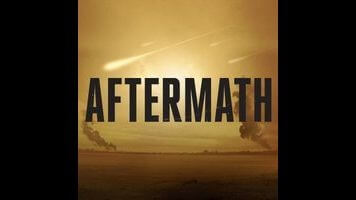Aftermath is so bonkers, you might not even notice the severed head

Gonzo storytelling is often the purview of the low-budget genre television show. Without quality production values and lacking the prestige or dramatic cache of its more polished brethren, TV series will often turn to the ridiculous or over-the-top. When this works, you get something like Z Nation’s recent episodes. And when it falters, it just feels slapdash, like an over-caffeinated screenwriter couldn’t be bothered to bear down and get a narrative right. Aftermath, Syfy’s latest foray into end-of-the-world entertainment, has potential, but only if it calms the hell down for five minutes and starts creating some believable characters and scenarios.
Just as you can’t accelerate a car too quickly lest you give yourself whiplash, an apocalyptic scenario can’t go from grounded family drama to demons possessing bodies and flying strangers into the sky without laying any foundation of who these people are and why we should care. We learn more about Rick Grimes’ personality in the opening five minutes of The Walking Dead’s pilot than Aftermath offers about any of its characters in the entire first episode. The Copeland family—Washington residents who find themselves caught up in a world falling apart—barely seem to like each other, let alone have any serious family bond. Mom Karen (Anne Heche) used to be in the Air Force and has no apparent respect for her college professor husband (James Tupper) and his field of expertise, religion and mythology. One of the twin daughters wants to run away, and the other knows odd facts. The son is good with guns. You now know as much about these people as the show seems to.
The weirdest thing about Aftermath is how unperturbed all of our main characters seem to be about the end of the world. The average person would likely greet a rain of fish (or a random boy turning into a human flesh-craving rage monster or a child being whisked away into the sky by a flying person) with at least 30 seconds of shell-shocked “What the fuck just happened?” awe. The Copeland family shakes it off and wonders how much gas they need in the RV. Bear in mind, everything listed above happens in the first 20 minutes of Aftermath. The sense of nonstop lunacy is intentional—the show wants to keep the viewer just as unsettled and ready for anything as its protagonists—but it’s often done in a ham-fisted way, pushing so quickly from one unexpected ordeal to the next that it leaves no chance to actually absorb what’s happening.
And what’s happening is ridiculous. In the opening minutes, it’s established that Earth (or at least the United States) is suffering a plague of natural disasters, one after the other, with no scientific explanation or logical justification for where they’re happening (earthquakes not happening along fault lines, and such). After a massive hurricane strikes the middle of their rural homestead, depositing said rain of fish, the Copelands have barely begun to clean up when it’s revealed people are being infected by some malevolent virus that turns them into crazed homicidal weirdos, with a range of consequences that are unpredictable, to put it mildly. After they’re forced to shoot a missing teen who shows up at their door asking for food, only to turn into the aforementioned homicidal crazy, they watch some sort of demon-ghost-spirit burst out of the body and fly away. This would be the moment normal people would take a beat and process things. Instead, Aftermath tries to deliver laugh lines that come across like these people have just met. (“We own a gun?” “We own a Bible?” said two people who have lived together in the same house for years never.)
From there, it only gets weirder. One of the daughters is kidnapped via a rage monster taking flight, so the rest of them load up the RV and set off to find her. (Presumably, they’re hoping this flying demon-person-thing sticks to the roadways as it soars through the heavens.) Soon they’re dealing with deranged gas station attendants, standoffs between stranded travelers, and brutal motorcycle gangs with hearts of gold. Meanwhile, the massive threat of infection creates a world where emergency military personnel are trying to create refugee stations to care for those still sane. And none of this even addresses the ongoing plague of natural disasters, up to and including meteors, threatening the planet. The show all but acknowledges this is book-of-Revelations-type stuff, and in terms of pure spectacle, it’s fairly gripping, albeit in a “can you believe this insanity?” kind of way. The show has a dark and goofy sense of humor about all of this, but again, the deadpan delivery tends to feel like a commentary on the show, rather than believable dialogue.
All the ingredients for a promisingly offbeat show are there, but Aftermath’s pilot is a harried mess that doesn’t know how to pull its elements together in a satisfying way. It could be accused of putting words in characters’ mouths that go against their personalities in the name of clumsy exposition or moving the narrative along, but that would require them to have defined personalities in the first place. Instead, the show appears to be getting to know everyone at the same time as the audience, meaning the world created comes across as anything but lived in. People switch emotional states with the speed of a shotgun blast. There’s a gas station explosion that approaches Naked Gun levels of absurdity with people’s lack of reaction to it. Aftermath wants to be fun (and funny), but it doesn’t yet trust the audience to find the humor in the extreme situations without putting a button on every moment. These conflicting parts could all come together as the show finds its feet, but for a first impression, this pilot nose-dives.